Dietary Supplements Statistics By Regions, Types, Usage, Demographics and User Percentage

Updated · Jan 09, 2025


TABLE OF CONTENTS
Introduction
Dietary Supplements Statistics: Many people in the world, both adults and children, take one or more vitamins or dietary supplements. Besides vitamins, these supplements can also have minerals, herbs, amino acids, enzymes, and other ingredients. Supplements come in many forms, like tablets, capsules, gummies, powders, drinks, and energy bars.
Some popular supplements include vitamin D and B12, minerals like Calcium and iron, herbs such as echinacea and garlic, and products like glucosamine, probiotics, and fish oil. We shall shed more light on the Dietary Supplements Statistics through this article.
Editor’s Choice
- From 2018 to 2020, the North American dietary supplements market grew from $42.6 billion to $50.7 billion. It’s expected to keep growing and reach about $72 billion by 2026.
- Around 70% of adults over 65 take dietary supplements, mainly for vitamins, minerals, and joint health.
- Approximately 25% of teenagers aged 14-18 now use supplements regularly.
- Supplement use drops to about 50% among adults over 70.
- By that time, the Asia-Pacific market will likely be around $20 billion smaller than North America’s.
- Europe has the smallest market of all the regions and is expected to stay that way.
- Vitamin and Supplement Market Facts
- By the end of 2024, the global market for dietary supplements is expected to reach $193.7 billion, growing at a rate of 9.1% every year until 2030.
- The vitamins market is estimated to be worth $55.9 billion in 2024, with an annual growth of 7.3%.
- Dietary Supplements Statistics stated that China’s market for vitamins and minerals is expected to bring in $5.33 billion by 2024.
- Dietary Supplements Statistics stated that around the same time, each person worldwide is expected to spend $4.12 on vitamins and minerals.
- In the U.S., the market for vitamin and mineral supplements is projected to grow to $30.5 billion by 2025.
- As of 2023, 74% of adults in the U.S. use dietary supplements, with 55% taking them regularly.
- The Asia-Pacific dietary supplements market was valued at $57.25 billion in 2022 and is expected to grow by 12.6% per year from 2023 to 2030.
- The global market for gummy vitamins is expected to increase from $4.3 billion in 2023 to $6.9 billion by 2033, growing at 4.8% per year.
- The protein supplements market is forecast to grow at 8% annually, reaching $32.6 billion by the end of 2027.
- The global market for probiotics is valued at over $2 billion and is growing by more than 7% annually.
You May Also Like To Read
- Vitamins And Supplements Statistics
- Health Care Devices Statistics
- Skincare Statistics
- Health And Fitness Statistics
- PTSD Statistics
- Personal Hygiene Products Statistics
- Fragrance Statistics
- Haircare Statistics
- Smartphone Addiction Statistics
- Wearable Devices Statistics
- Makeup Statistics
- Sexual Assault Statistics
What Are Dietary Supplements?
A Dietary supplement is a product designed to add extra nutrients to an individual’s diet. It can be in the form of a tablet, capsule, pill, powder, or liquid. Supplements may provide nutrients that come from food or are made in a lab to help people consume more.
The main types of nutrients in supplements include vitamins, minerals, fiber, fatty acids, and amino acids. Some supplements may also have substances that are not necessary for survival but are believed to have health benefits, like plant pigments or polyphenols.
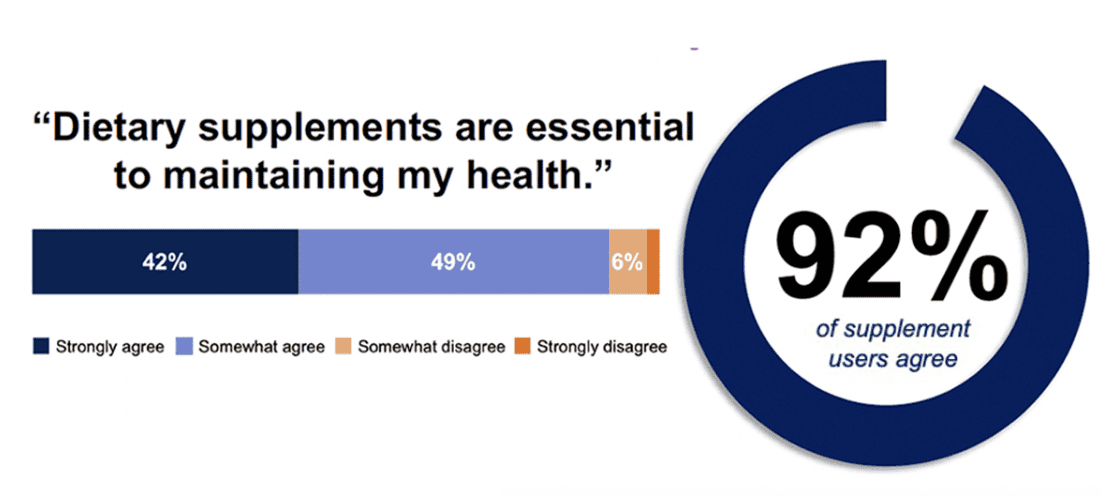 (Source: crnusa.org)
(Source: crnusa.org)
Animal products, like collagen from fish or chickens, can also be used in supplements. These can be sold on their own or mixed with other ingredients. In Europe, the European Commission has set rules to make sure supplements are safe and properly labelled.
The dietary supplement industry was worth about $151.9 billion in 2023. In the U.S., there are more than 50,000 different supplement products, and around 50% of adults use them. Multivitamins are the most popular type of supplement. The U.S. National Institutes of Health says that supplements “might be helpful” for people who lack certain nutrients in their diet, but it’s important to get approval from a doctor first.
General Dietary Supplements Statistics
- Dietary Supplements Statistics stated that nearly 77% of adults in the U.S. take some form of supplement.
- On average, Americans spend $96.50 on vitamins and supplements each time they travel.
- By 2022, the U.S. market for vitamins and supplements was expected to reach $35.6 billion.
- People from the Greatest Generation spend the most, with an average of $129.58 per purchase on supplements.
- Women are 25.59% more likely than men to use supplements.
- 74% of Americans are worried that supplements don’t have enough scientific proof behind them.
- By 2024, the U.S. supplement market is projected to grow to $56.7 billion.
- Vitamin D, C, and B are some of the most commonly taken supplements, with over half of Americans using them daily.
- Dietary Supplements Statistics stated that Calcium, magnesium, and iron are other popular mineral supplements.
- Herbal supplements like Ginseng, Echinacea, and Turmeric are becoming more widely used.
(Source: market.us)
| Year | USD Millions |
|
2022 |
164.6 |
| 2023 |
178.4 |
|
2024 |
191.5 |
| 2025 |
211.8 |
|
2026 |
231.9 |
| 2027 |
248.9 |
|
2028 |
261.7 |
| 2029 |
283.7 |
|
2030 |
304.5 |
| 2031 |
330.0 |
|
2032 |
361.4 |
- The global dietary supplements market is projected to grow from USD 156 billion in 2023 to USD 306 billion by 2033, with a compound annual growth rate (CAGR) of 7.0%.
- In 2023, vitamins constituted the largest product segment, capturing 34.5% of the market, fueled by increased consumer awareness of nutritional deficiencies.
- Tablets were the preferred form of dietary supplements in 2023, holding a 21.2% share, appreciated for their convenience and precise dosage control.
- Additional supplements comprised the most substantial market segment in 2023, accounting for 34.4%, driven by consumer demand for enhanced nutritional value.
- Energy and weight management supplements were the primary application area in 2023, with a 32.4% market share, indicative of a consumer emphasis on healthy living.
- The infant demographic dominated the market in 2023, representing 34.5% of the total market, due to the high demand for convenient and nutritious supplement options.
- Offline distribution channels led the market with a 78.3% share in 2023, as consumers preferred traditional retail experiences such as shopping at supermarkets.
- Dietary Supplements Statistics state that people are more careful about where their supplements come from, their quality, and how safe they are.
- More people are looking for natural and organic supplements that don’t have artificial additives or preservatives.
- By 2023, U.S. sales of vitamins and minerals were expected to hit $4.06 billion.
- The market for beauty supplements is growing quickly, with an expected annual growth rate of 9.5% through 2026.
- As people get older, the demand for dietary supplements keeps increasing due to health and ageing concerns.
- Athletes and fitness fans often use supplements to improve performance, recover faster, and meet their nutrition needs.
- Supplements are used to fix nutrition gaps, especially when specific vitamins are missing from the diet.
- Multivitamins are becoming more popular because they provide several essential nutrients in one easy pill.
- Some supplements are advertised for weight loss, though their safety and effectiveness can vary.
- Countries have different rules about supplements. In the U.S., they are treated like food, not health products.
- Before starting a supplement routine, it’s best to check with a doctor, especially if you have health problems or take medication that could interact with the supplements.
Dietary Supplements Regional Statistics
#1. North America Dietary Supplements Market
- In 2023, North America made up 33% of the global dietary supplements market.
- The demand for products focused on health and mental well-being has led to more investment in research and product development.
- Despite uncertainty over existing regulations, the market is growing due to changes in rules, the rise of the self-care movement, and growing scientific evidence showing how important diet is for good health.
#2. S. Dietary Supplements Market Trends
- The dietary supplements market in the U.S. is expected to grow by 5.7% every year from 2024 to 2030.
- Key reasons for the growth include rising healthcare costs, changes in food labeling rules, advances in science and technology, an aging population, and more people interested in using diet to improve their health.
#3. Asia Pacific Dietary Supplements Market Trends
- In 2023, Asia Pacific held 35% of the market share. Spending on health products is increasing in the region due to a rise in fitness and sports activities.
- Countries like China, Japan, and India have large populations and are key markets. In this region, products must be approved by regulatory bodies before they can claim health benefits.
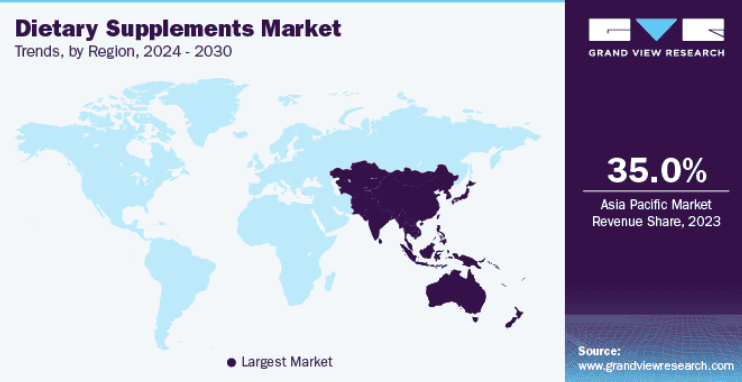 (Source: grandviewresearch.com)
(Source: grandviewresearch.com)
- China had the largest share in Asia in 2023, with over 40% of the market. The growing interest in health and the variety of convenient, flavored products are helping to boost demand.
- Japan’s dietary supplement market surpassed USD 10 billion in 2023 and is expected to keep growing. Japan is a leader in preventive healthcare because of its older population.
- Indonesia’s market was valued at over USD 2 billion in 2023 and has been growing thanks to government efforts to increase awareness about the benefits of supplements.
- Other smaller countries like Thailand are also growing in demand, with Thailand expected to see about 13% annual growth from 2024 to 2030.
- Australia is expected to see major growth in the next decade, with more than 60% of Australians taking supplements due to better product quality and increased awareness.
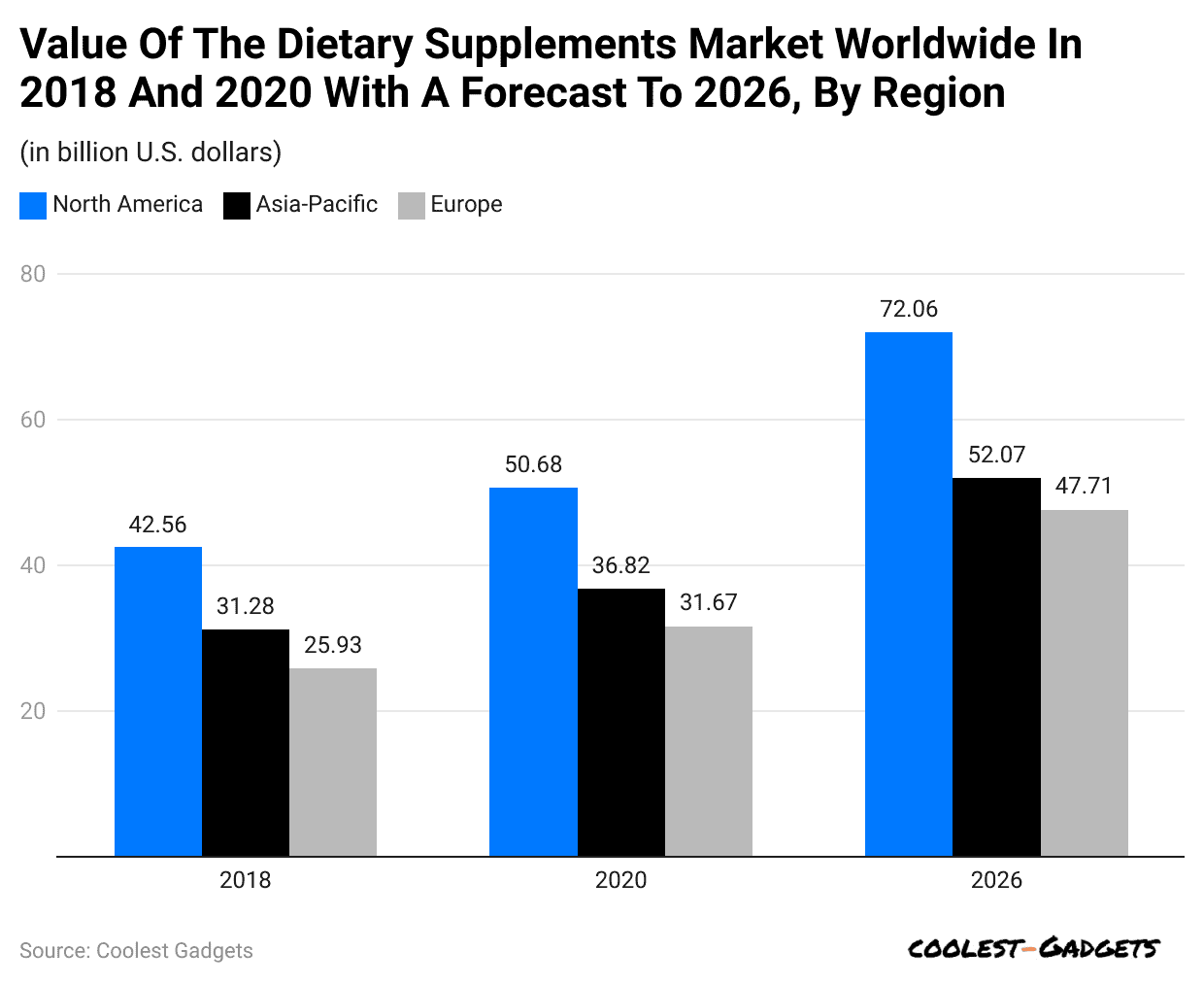 (Reference: statista.com)
(Reference: statista.com)
#4. Europe Dietary Supplements Market Trends
- The market for dietary supplements in Europe is expected to grow at 7.0% annually from 2024 to 2030.
- The rise in lactose intolerance and obesity has increased the demand for probiotic products.
- In Germany, demand is growing because more scientific evidence supports the use of dietary supplements for treating health conditions like inflammatory bowel disease (IBD) and infectious diarrhea.
#5. Middle East and Africa Dietary Supplements Market Trends
- The dietary supplements market in the Middle East & Africa is predicted to grow by 10.1% annually from 2024 to 2030.
- The expanding healthcare industry and the rising number of young, working people are driving up demand for health-related products.
- The region’s higher disposable income, especially in the Middle East, will also help boost sales and revenue.
You May Also Like To Read
- Fitbit Statistics
- Fitness Equipment Statistics
- Yoga Industry Statistics
- Workplace Injury Statistics
- Technology Addiction Statistics
- Workplace Stress Statistics
- CBD Statistics
- Nursing Burnout Statistics
- AI In Healthcare Statistics
- Mental Health Statistics
Dietary Supplements By Types Statistics
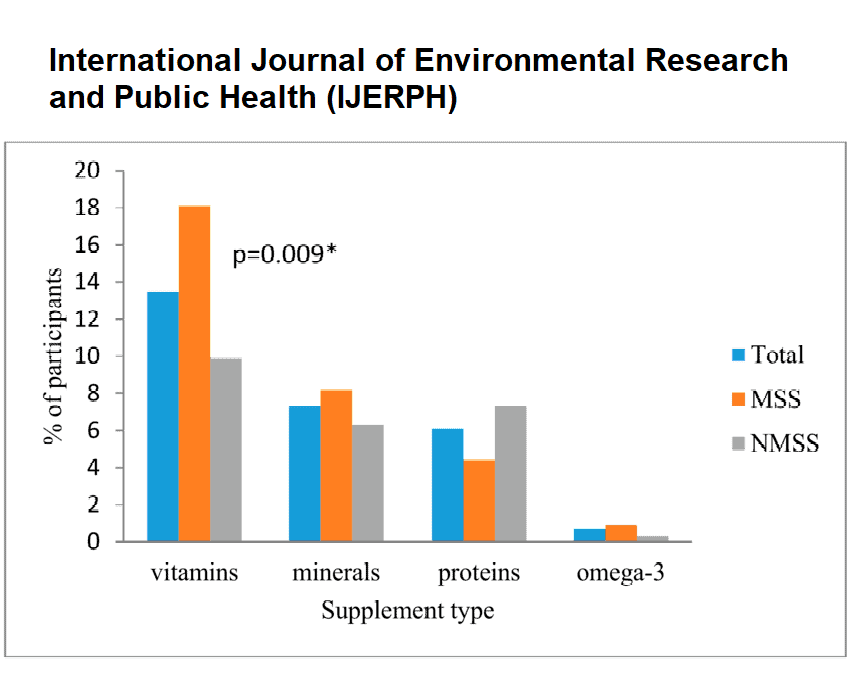
(Source: researchgate.net)
Vitamins
- Over 50% of Americans take a daily multivitamin, with vitamin D being the most popular single supplement.
- Vitamin C is the second most common vitamin supplement worldwide, with a global market worth over $1 billion.
- About 17% of adults in the U.S. use vitamin E supplements, mainly for its antioxidant and skin health benefits.
- Dietary Supplements Statistics state that around 15% of older adults in the U.S. have a vitamin B12 deficiency, which increases the use of supplements.
- Pregnant women often take folic acid to help prevent congenital disabilities, with about 70% of pregnant women in the U.S. following this advice.
Minerals
- Calcium supplements are widely used, especially by older women. About 43% of U.S. women over 60 take Calcium regularly.
- Iron deficiency affects about 25% of people worldwide, which boosts the demand for iron supplements.
- Magnesium supplements have increased in popularity by 15% recently, as they are believed to support sleep and relaxation.
- Around 12% of Americans use zinc supplements, particularly during cold and flu season.
- About 9% of U.S. adults take selenium supplements, mostly for their antioxidant effects.
Herbal and Botanical Supplements
- In 2023, U.S. sales of herbal and botanical supplements totaled $9.6 billion, making them the most popular dietary supplement type.
- Echinacea is one of the top-selling herbal supplements, earning over $100 million a year.
- Turmeric and curcumin supplements have grown by 30% in sales due to their anti-inflammatory benefits.
- Garlic supplements, used for heart health, are taken by about 8% of U.S. adults.
- Ginkgo biloba supplements, often used for memory support, are taken by around 2% of the U.S. population.
Amino Acids and Proteins
- Protein supplements, like whey and plant-based powders, make up over 60% of the global sports nutrition market.
- Branched-chain amino acids (BCAAs) are popular among athletes to improve performance and reduce muscle pain.
- Glutamine is one of the most common amino acid supplements, with $107 million in U.S. sales in 2021.
- Lysine supplements are used to help prevent and manage herpes simplex virus infections.
- Creatine is a favorite supplement among strength athletes, with about 40% of athletes using it to boost performance.
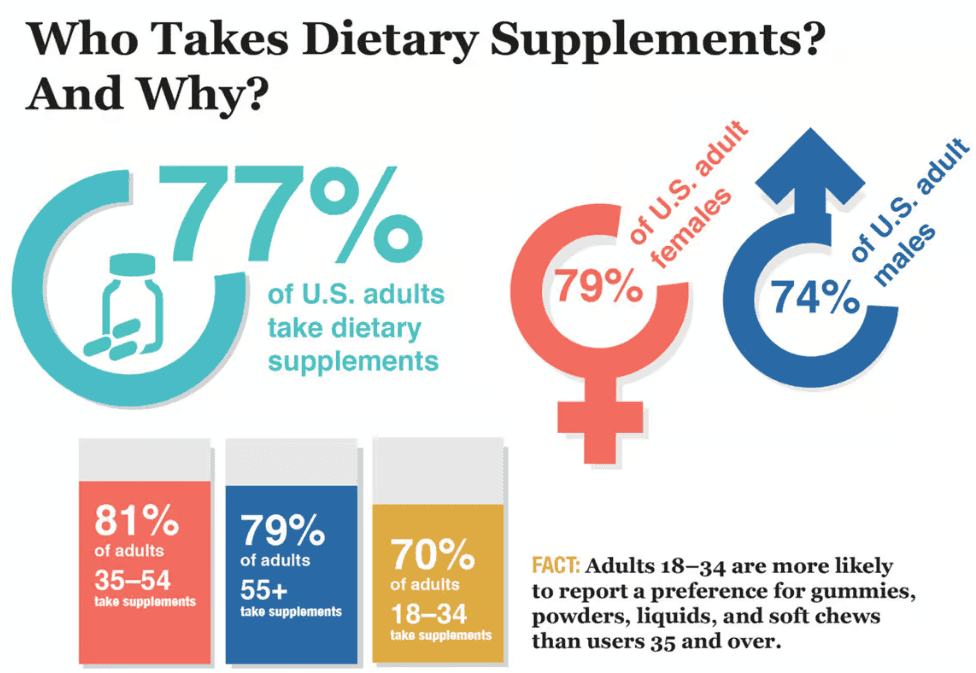 (Source: market.us)
(Source: market.us)
Enzymes and Probiotics
- The global market for digestive enzyme supplements is expected to exceed $1 billion by 2027, driven by concerns about digestive health.
- In 2023, probiotic supplements had a market value of $4.5 billion in the U.S., with a focus on improving gut health.
- Dietary Supplements Statistics stated that Lactobacillus and Bifidobacterium are the most common types of probiotics in supplements, providing many health benefits.
- People with digestive issues, like pancreatic insufficiency, often use digestive enzyme supplements.
- Probiotic use among children has increased by 65% in the last 10 years as more parents seek to support their kids’ immune and digestive health.
Percentage of People Who Use Dietary Supplements
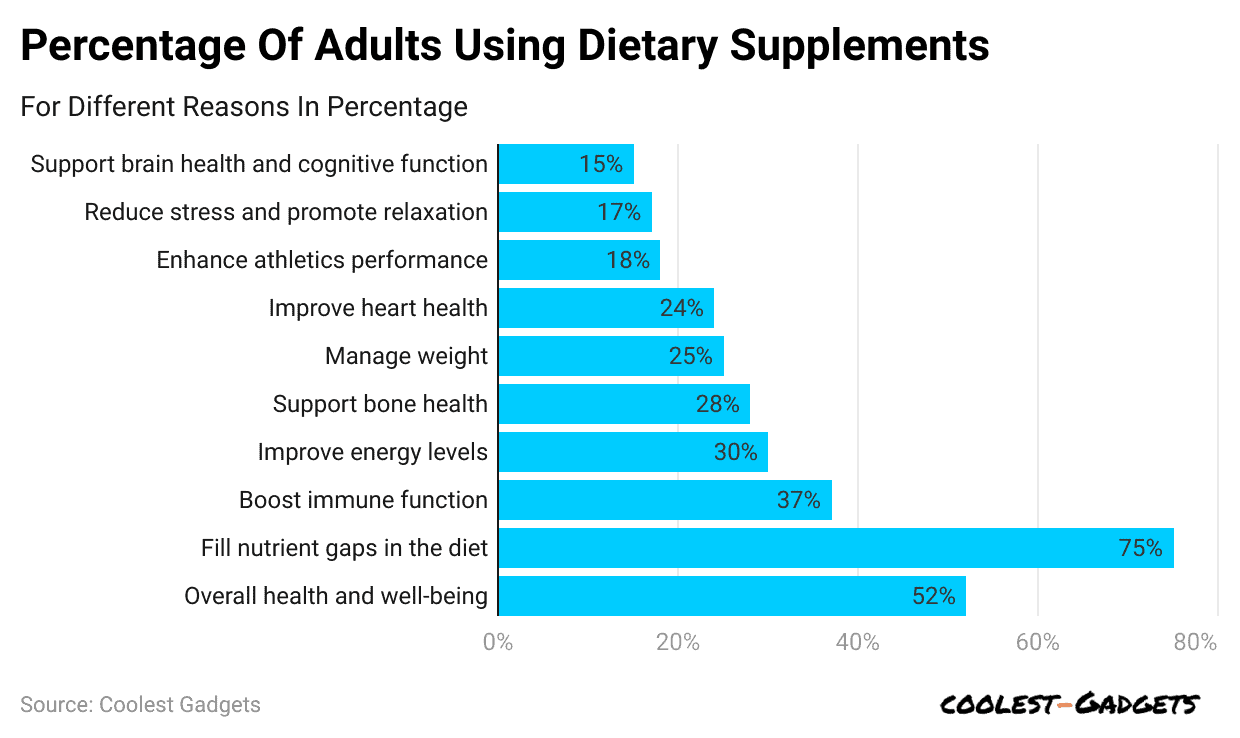 (Reference: market.us)
(Reference: market.us)
| Different Reasons in % | % |
|
Support brain health and cognitive function |
15% |
| Reduce stress and promote relaxation |
17% |
|
Enhance athletics performance |
18% |
| Improve heart health |
24% |
|
Manage weight |
25% |
| Support bone health |
28% |
|
Improve energy levels |
30% |
| Boost immune function |
37% |
|
Fill nutrient gaps in the diet |
75% |
| Overall health and well-being |
52% |
Dietary Supplements Statistics by Demographics
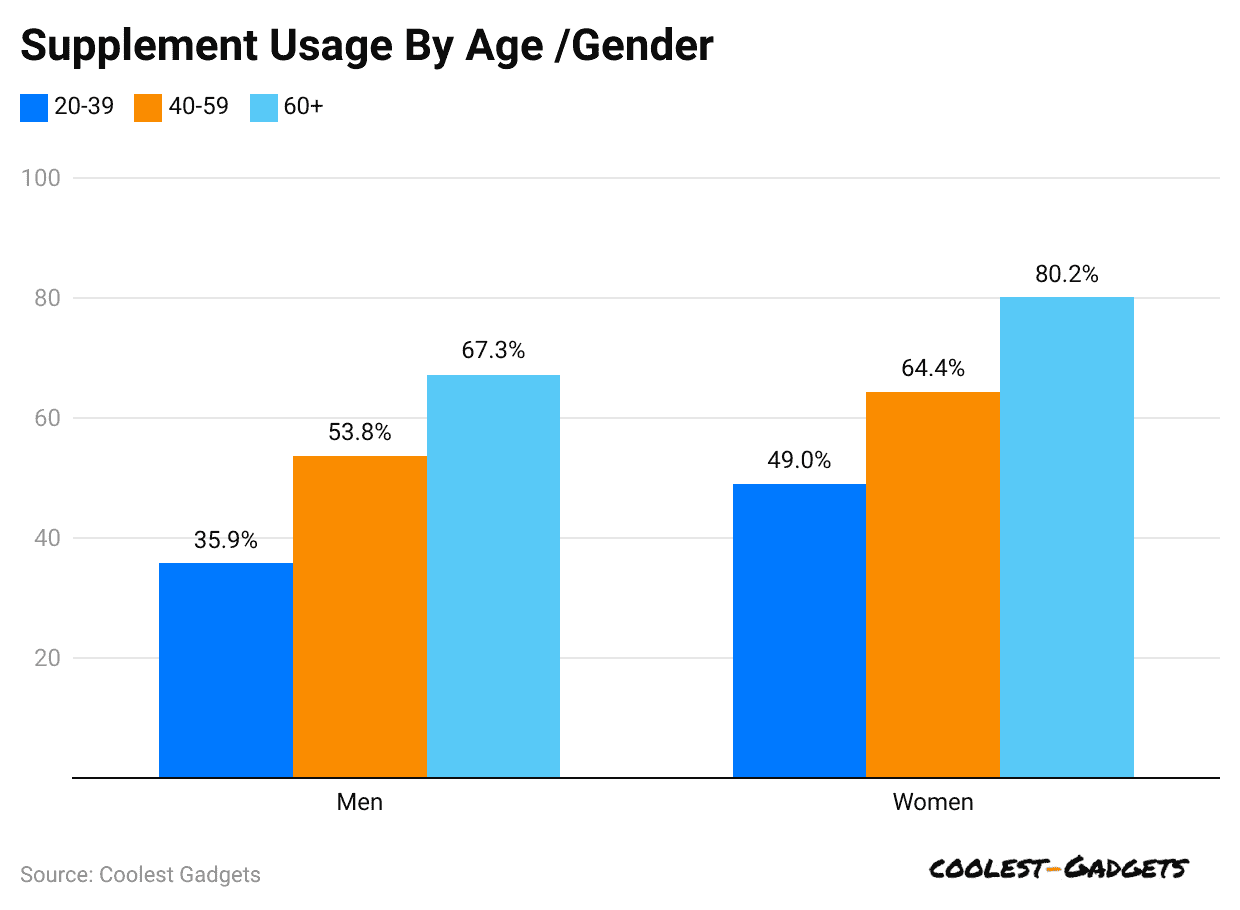 (Reference: enterpriseappstoday.com)
(Reference: enterpriseappstoday.com)
- Women generally take more dietary supplements than men because of their unique health needs and life stages.
- Pregnant women often take prenatal vitamins to help with the baby’s development and to meet their increased nutritional needs during pregnancy.
- Women also tend to use supplements for things like beauty, fertility, and bone health, including calcium and vitamin D.
- Men have traditionally used fewer supplements than women, but this is starting to change.
- Men typically take supplements to improve their health, build muscle, and enhance their performance in sports or exercise.
- Protein powders, creatine, omega-3 fatty acids, and other sports-related supplements are popular among men.
- Some supplements are made specifically for one gender, like those for prostate health for men and those for menopause for women.
- Women may take supplements to help with hormone balance during times like menstruation or menopause.
- Men may use supplements that help support prostate health or maintain healthy testosterone levels.
- Americans spend more than $2.1 billion every year on weight loss pills.
- Dietary Supplements Statistics stated that about 21% of women and 10% of men in the U.S. have tried weight loss supplements.
- Women use iron supplements 112% more often than men.
- Since men and women often have different health goals, the supplements they choose to take can vary.
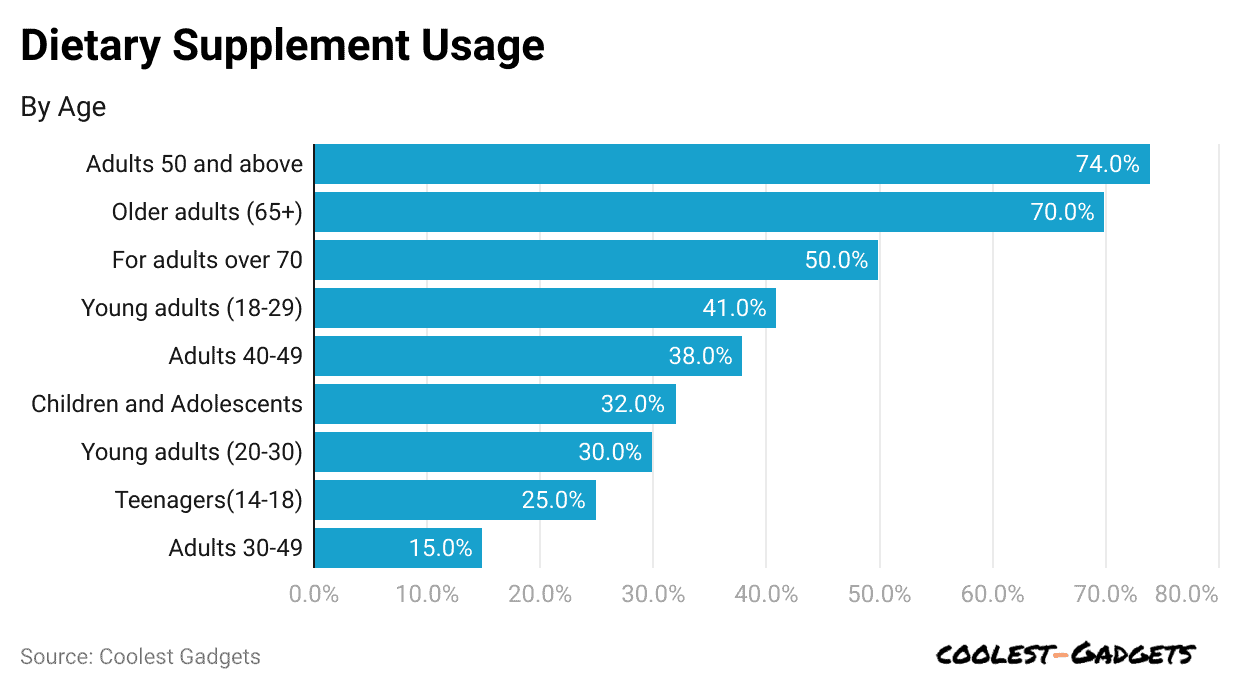 (Reference: market.us)
(Reference: market.us)
- Adults aged 50 and older are more likely to take dietary supplements, with about 74% using them regularly.
- Around 41% of young adults aged 18-29 take supplements regularly for different health reasons.
- About 32% of kids and teens use supplements, mostly for vitamins and minerals.
- The age group with the biggest rise in supplement use recently is adults aged 30-49, which increased by 15%.
- Dietary Supplements Statistics state that around 70% of adults over 65 take dietary supplements, mainly for vitamins, minerals, and joint health.
- Approximately 25% of teenagers aged 14-18 now use supplements regularly.
- Supplement use drops to about 50% among adults over 70.
- Young adults in their 20s and early 30s mainly use supplements for sports and weight management, with 30% taking them regularly.
- Adults aged 40-49 are more likely to take supplements for heart health and stress management, with about 38% using them for these reasons.
- The most common supplement used across all age groups is multivitamins, with around 52% of people taking them.
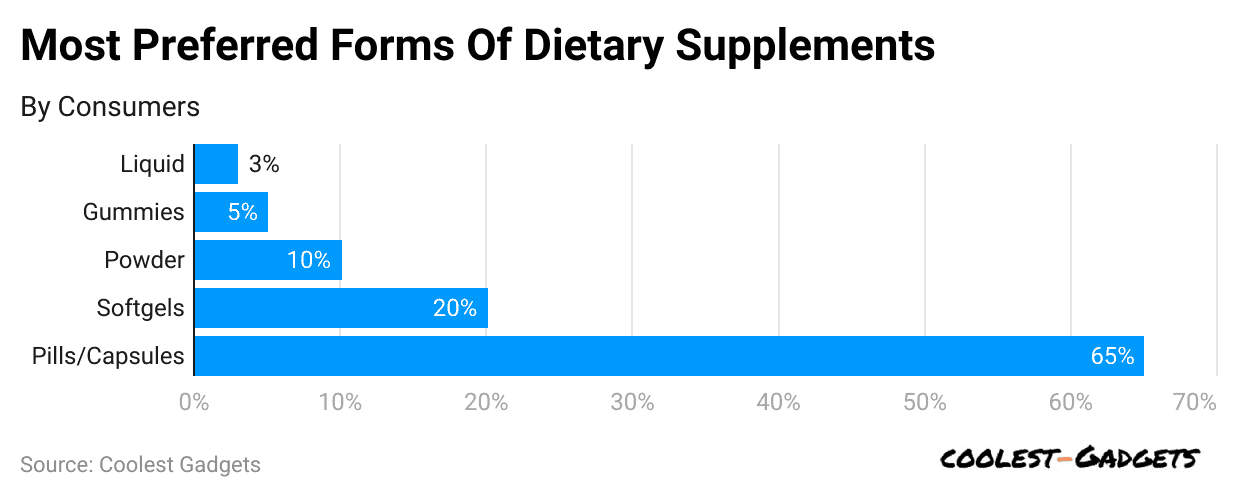 (Reference: market.us)
(Reference: market.us)
- Non-Hispanic White people in the U.S. usually use more dietary supplements than other groups. This is often due to better healthcare access, higher income, and higher education levels.
- More Hispanics and Latinos are starting to use dietary supplements, mainly because of changing cultures, better education, and growing awareness of health.
- Popular supplements in this group include multivitamins, omega-3 fatty acids, and various herbal treatments.
- Dietary Supplements Statistics stated that African Americans typically take fewer dietary supplements than other racial groups, mostly using them for weight loss.
- However, natural and herbal supplements, often inspired by African traditional medicine, are becoming more popular.
- Asian Americans may use dietary supplements in different ways based on their culture. They commonly take vitamins and minerals, as well as supplements from traditional Chinese medicine and Ayurvedic medicine.
- Native American communities have been using natural remedies and herbal supplements for health and healing for many years.
- These often include plants like ginseng and echinacea, which help with various health issues.
Conclusion
Dietary supplements are important for many people, offering a wide variety of products to help with different health needs. The market for dietary supplements is worth billions of dollars and keeps growing. More and more people are using supplements to improve their health, fill in nutrition gaps, or address specific health issues. Some of the popular options include vitamins, minerals, herbal products, and specialty items.
Things like age, gender, ethnicity, and where you live can affect the types of supplements people use. There’s a growing interest in natural, immune-boosting supplements, although different groups may prefer different products. The future of the supplement market is focused on personalized nutrition, eco-friendly practices, and digital tools. There’s also more focus on mental health and overall well-being, along with a demand for clear labeling and environmentally friendly sourcing.
However, it’s important to be careful when using supplements and to talk to a doctor before making decisions to ensure they are safe and effective. We have shed enough light on Dietary Supplements Statistics through this article.
Sources
FAQ.
Studies have shown that some dietary supplements, like melatonin for jet lag, can be helpful, while others, such as ginkgo for dementia, may not be very effective. Supplements bought in stores or online may not always be the same as those used in research and could differ in important ways.
Also, 26% of kids aged 2-5 and 14% of those aged 6-11 took supplements. The number grew with age, from 10% of people aged 12-19 to 49% of men and 59% of women aged 60 and older.

Saisuman is a talented content writer with a keen interest in mobile tech, new gadgets, law, and science. She writes articles for websites and newsletters, conducting thorough research for medical professionals. Fluent in five languages, her love for reading and languages led her to a writing career. With a Master’s in Business Administration focusing on Human Resources, Saisuman has worked in HR and with a French international company. In her free time, she enjoys traveling and singing classical songs. At Coolest Gadgets, Saisuman reviews gadgets and analyzes their statistics, making complex information easy for readers to understand.











